语法复习一:句子成分、简单句、并列句和复合句
(完整)高中英语语法练习大全,推荐文档

Most Saturday evenings there is a party, even at harvest time. These parties often make us very happy. We cook meat on an open fire outside. It's great! Americans eat a lot of meat — too much in my opinion. Some of my friends drink beer. I don't, because I have to drive home after the party. In your letter you asked about the time in different areas of the States. There are five
-1-
different time areas in the States. In my state we are fourteen hours behind Beijing time. How many different time areas do you have in China? Well, I must stop and get some sleep. Please give my best regards to your parents.
A. wet and cold B. is wet and cold
C. not wet and cold D. were wet and cold
( ) 3. The apple tasted ____.
A. sweets
高中英语基础语法复习一:句子成分、简单句、并列句和复合句
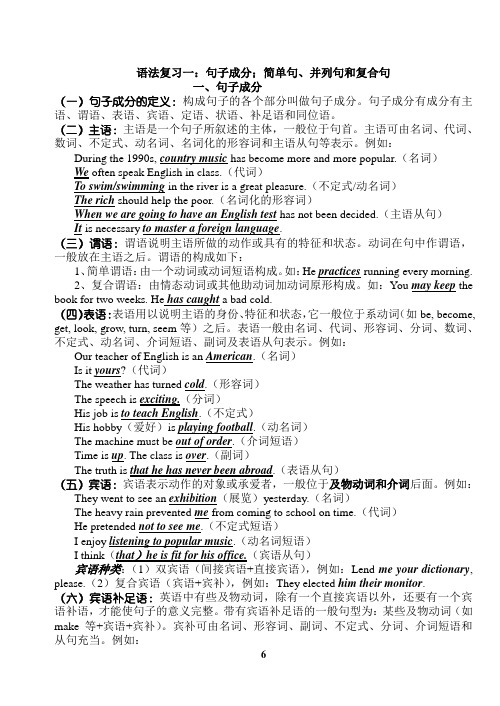
语法复习一:句子成分;简单句、并列句和复合句一、句子成分(一)句子成分的定义:构成句子的各个部分叫做句子成分。
句子成分有成分有主语、谓语、表语、宾语、定语、状语、补足语和同位语。
(二)主语:主语是一个句子所叙述的主体,一般位于句首。
主语可由名词、代词、数词、不定式、动名词、名词化的形容词和主语从句等表示。
例如:During the 1990s, country music has become more and more popular.(名词)We often speak English in class.(代词)To swim/swimming in the river is a great pleasure.(不定式/动名词)The rich should help the poor.(名词化的形容词)When we are going to have an English test has not been decided.(主语从句)It is necessary to master a foreign language.(三)谓语:谓语说明主语所做的动作或具有的特征和状态。
动词在句中作谓语,一般放在主语之后。
谓语的构成如下:1、简单谓语:由一个动词或动词短语构成。
如:He practices running every morning.2、复合谓语:由情态动词或其他助动词加动词原形构成。
如:You may keep the book for two weeks. He has caught a bad cold.(四)表语:表语用以说明主语的身份、特征和状态,它一般位于系动词(如be, become, get, look, grow, turn, seem等)之后。
表语一般由名词、代词、形容词、分词、数词、不定式、动名词、介词短语、副词及表语从句表示。
例如:Our teacher of English is an American.(名词)Is it yours?(代词)The weather has turned cold.(形容词)The speech is exciting.(分词)His job is to teach English.(不定式)His hobby(爱好)is playing football.(动名词)The machine must be out of order.(介词短语)Time is up. The class is over.(副词)The truth is that he has never been abroad.(表语从句)(五)宾语:宾语表示动作的对象或承爱者,一般位于及物动词和介词后面。
中考英语语法专项复习:简单句、并列句和复合句.doc

中考英语语法专项复习:简单句、并列句和复合句句子按结构可分为简单句、并列句和复合句。
复合句中包含宾语从句、状语从句或定语从句等。
◆一简单句简单句就是只包含一个主谓结构的句子,其句式结构主要有五种:①主 + 谓。
He works in a big company. 他在一家大公司工作。
②主 + 系 + 表。
She is a kind girl. 她是一个善良的女孩。
③主 + 谓 + 宾。
Ann eats junk food twice a week .安一周吃两次垃圾食品。
④主 + 谓 + 间宾 + 直宾。
He gave me a pen .他给我一支钢笔。
⑤主 + 谓 + 宾 + 宾补。
He kept me waiting for two hours .他让我等了两小时。
◆二并列句并列句由两个或两个以上的简单句连接而成。
并列句中的各简单句同等重要,没有从属关系,是并列的关系,之间用并列连词连接。
1. 表示顺承的并列连词有and / not only …but (also)等。
如:She not only gaveus a lot of advice, butalso helped us to overcome difficulties .他不仅给了我们很多建议,而且还帮助我们克服困难。
2. 表示选择的并列连词有or,either …or …等。
如:Either you or Maria will haveto go .你或玛丽亚得去一趟。
3. 表示转折的并列连词有but,yet,however 等。
如:It is hot in summer here , butit’s not cold in winter .这里夏天热,但冬天不冷。
4. 表示因果关系的并列连词有so,如:He works hard , so he is one of the topstudents in our class .因为他学习努力,所以他是我们班最优秀的学生之一。
句子成分及简单句,并列句,复合句

简单句(Simple sentence)及句子成分(Members of the sentence)(一)简单句一、定义:由一个主语部分和一个谓语部分组成。
eg. He [often] goes [to school][by bike]. He gave me a dictionary [yesterday].He has finished the work [already]. He [always] makes me <happy>.He is doing (his) homework. He did a (good) job. He is a student.注:表主语, 表谓语, 表宾语, ( )表定语, [ ]表状语, < >表补语, 表表语。
二、简单句的五种基本句型:1. 主语+谓语(不及物动词) [S + Vi]eg. The children are playing [happily]. 孩子们正在高兴地玩。
(Such) things [often] happen. 这种事情经常发生。
(The new) term begins [in September]. 新学年从九月份开始。
注:不及物动词后不带宾语,若其后需带宾语,须搭配一介词to/at/on/for等。
eg. He arrived in Beijing [yesterday]. He was listening to the music.2. 主语+谓语(及物动词)+宾语[S+Vt+O]eg. The Greens enjoy living in China. 格林一家喜欢住在中国。
I missed the train. 我错过了火车。
注:及物动词其后一般必须带宾语。
常用跟单宾语的动词有:enjoy, forget, remember, guess, love, hate, supply, use 等3. 主语+谓语+表语[S+V+P]该句型谓语动词为连系动词。
高考英语语法复习 ---简单句并列句复合句
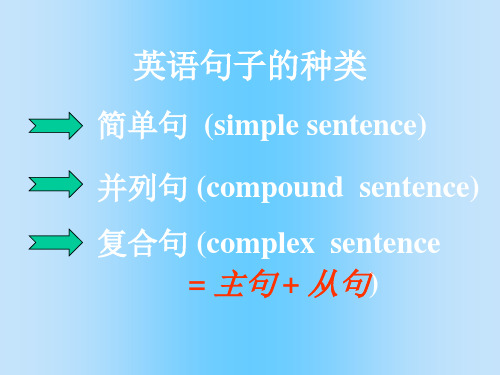
(武汉调研4月) Put yourself in situations where you will be forced to communicate in English, ___ you will see more progress over time. A. or B. so C. yet D. and (崇文4月) You must get up early in the morning, ___ we’ll have to leave without you A.and B. but C. or D. so
英语句子的种类
简单句 (simple sentence) 并列句 (compound sentence)
复合句 (complex sentence = 主句 + 从句)
简单句的五种基本句型
• 主语 + 不及物动词 ( S + Vi ) • 主语 + 及物动词 +宾语 ( S + Vt + O) • 主语 + 系动词 + 表 (S + LV + predicative) • 主语+双宾动词+间宾+直宾(S +Vt +O.indir+O. dir) • 主语 + 宾补动词 +宾语 +宾语补语 • (S + Vt. + O + O. compl) •There + be / stand/ lie / live...
其它平行结构:not…but…, either…or…, neither…nor, not only…but also…, would rather…than…(宁愿……不愿 ……), rather than(而不), as well as(既……也……)等。
句子的成分与结构
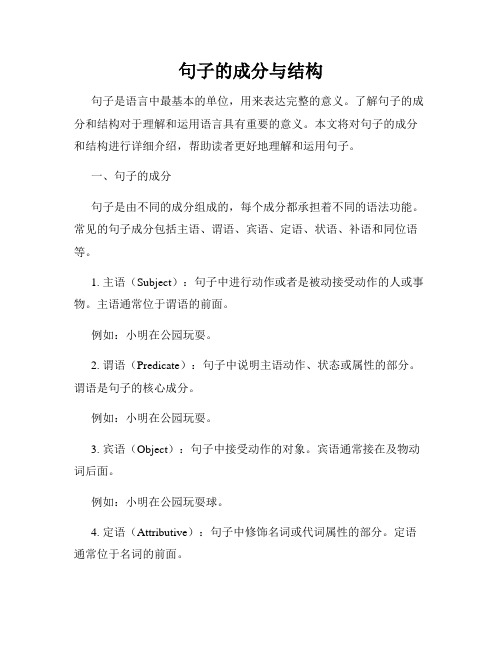
句子的成分与结构句子是语言中最基本的单位,用来表达完整的意义。
了解句子的成分和结构对于理解和运用语言具有重要的意义。
本文将对句子的成分和结构进行详细介绍,帮助读者更好地理解和运用句子。
一、句子的成分句子是由不同的成分组成的,每个成分都承担着不同的语法功能。
常见的句子成分包括主语、谓语、宾语、定语、状语、补语和同位语等。
1. 主语(Subject):句子中进行动作或者是被动接受动作的人或事物。
主语通常位于谓语的前面。
例如:小明在公园玩耍。
2. 谓语(Predicate):句子中说明主语动作、状态或属性的部分。
谓语是句子的核心成分。
例如:小明在公园玩耍。
3. 宾语(Object):句子中接受动作的对象。
宾语通常接在及物动词后面。
例如:小明在公园玩耍球。
4. 定语(Attributive):句子中修饰名词或代词属性的部分。
定语通常位于名词的前面。
例如:美丽的花园。
5. 状语(Adverbial):句子中修饰动词、形容词或副词的成分。
状语可以表示时间、地点、方式、原因等。
例如:我每天早上都去跑步。
6. 补语(Complement):句子中补充说明主语、宾语或谓语的性质或状态的部分。
补语通常位于动词、形容词或名词后面。
例如:他是医生。
7. 同位语(Appositive):句子中用来进一步说明名词或代词的成分。
同位语通常位于名词的后面,并用逗号隔开。
例如:小明,我们的班长,是个好学生。
二、句子的结构句子的结构指的是句子中各个成分的语法关系和排列顺序。
1. 简单句(Simple Sentence):由一个主谓结构构成的句子。
例如:我喜欢看电影。
2. 复合句(Compound Sentence):由两个或者更多的主谓结构构成的句子。
例如:我喜欢看电影,但是他更喜欢读书。
3. 并列句(Coordinate Sentence):由两个或者更多的具有相同地位的分句构成的句子。
例如:我喜欢看电影,他喜欢读书。
4. 从句(Subordinate Clause):不能独立存在的句子,必须依附于主句使用。
简单句、并列句、复合句,傻傻分不清楚

简单句、并列句、复合句,傻傻分不清楚英语中句子按结构分为:简单句,并列句和复合句。
简单句,n个主语和+1个谓语或者1个主语+n个谓语结构的句子。
并列句,多个简单句由并列连词连接,句子之间是独立平等的关系。
即简单句+并列连词+简单句.....复合句,有多个主谓结构的句子,并且一(多)个主谓结构在句子里做句子的某一(些)成分,比如做主语、表语、宾语、状语、定语。
(点击前往句子成分篇)复合句是“1主句+n从句(n≥1)”的结构01■这世上没有不含主谓结构的句子,如果有,那它就不是完整的句子。
首先,让我们来一波测试。
请判断以下句子的类型。
(A. 简单句 B.并列句 C.复合句)1.When you cross a main road, you must be careful.2.I love the feeling of being cared.3.If it snows tomorrow, we will build a snowman.4.You should go to his place and apologize.5.He is the man whom I saw yesterday.6.I'd better take an umbrella, for it is going to rain.7.She told us her hope that she would become a pianist.8.It took us twenty minutes to clean the room yesterday.9.We danced and sang all night.10.He worked hard, and became an architect.接下来我们来看答案:CACBC BCAAB02■句子类型区分在于结构。
简单句,单一主谓结构;并列句,多个主谓结构,由并列连词连接;复合句,多个主谓结构,有引导词,从句充当句子成分。
简单句、并列句、复合句
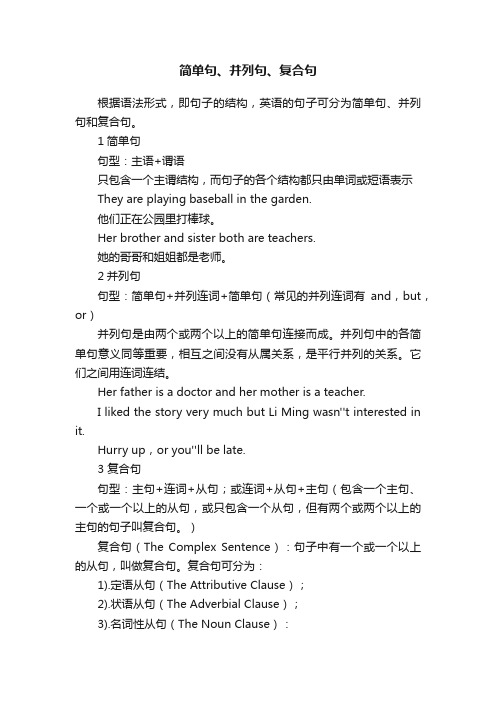
简单句、并列句、复合句根据语法形式,即句子的结构,英语的句子可分为简单句、并列句和复合句。
1简单句句型:主语+谓语只包含一个主谓结构,而句子的各个结构都只由单词或短语表示They are playing baseball in the garden.他们正在公园里打棒球。
Her brother and sister both are teachers.她的哥哥和姐姐都是老师。
2并列句句型:简单句+并列连词+简单句(常见的并列连词有and,but,or)并列句是由两个或两个以上的简单句连接而成。
并列句中的各简单句意义同等重要,相互之间没有从属关系,是平行并列的关系。
它们之间用连词连结。
Her father is a doctor and her mother is a teacher.I liked the story very much but Li Ming wasn''t interested in it.Hurry up,or you''ll be late.3 复合句句型:主句+连词+从句;或连词+从句+主句(包含一个主句、一个或一个以上的从句,或只包含一个从句,但有两个或两个以上的主句的句子叫复合句。
)复合句(The Complex Sentence):句子中有一个或一个以上的从句,叫做复合句。
复合句可分为:1).定语从句(The Attributive Clause);2).状语从句(The Adverbial Clause);3).名词性从句(The Noun Clause):一、定语从句定语从句的定义定语从句在句子中作定语,用来修饰一个名词、名词词组或者代词。
先行词和引导词被修饰的名词、名词词组或代词叫做先行词;在先行词和定语从句之间起连接作用的词叫做引导词。
引导词分为“关系代词”和“关系副词”。
关系代词和关系副词关系代词有:who, whom, whose, that, which, as。
语法一(简单句,并列句,定语从句)(
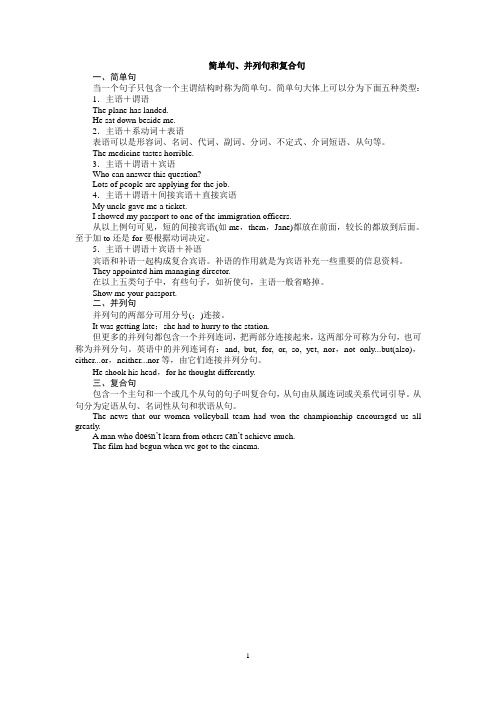
简单句、并列句和复合句一、简单句当一个句子只包含一个主谓结构时称为简单句。
简单句大体上可以分为下面五种类型:1.主语+谓语The plane has landed.He sat down beside me.2.主语+系动词+表语表语可以是形容词、名词、代词、副词、分词、不定式、介词短语、从句等。
The medicine tastes horrible.3.主语+谓语+宾语Who can answer this question?Lots of people are applying for the job.4.主语+谓语+间接宾语+直接宾语My uncle gave me a ticket.I showed my passport to one of the immigration officers.从以上例句可见,短的间接宾语(如me,them,Jane)都放在前面,较长的都放到后面。
至于加to还是for要根据动词决定。
5.主语+谓语+宾语+补语宾语和补语一起构成复合宾语。
补语的作用就是为宾语补充一些重要的信息资料。
They appointed him managing director.在以上五类句子中,有些句子,如祈使句,主语一般省略掉。
Show me your passport.二、并列句并列句的两部分可用分号(;)连接。
It was getting late;she had to hurry to the station.但更多的并列句都包含一个并列连词,把两部分连接起来,这两部分可称为分句,也可称为并列分句。
英语中的并列连词有:and, but, for, or, so, yet, nor,not only...but(also),either...or,neither...nor等,由它们连接并列分句。
He shook his head,for he thought differently.三、复合句包含一个主句和一个或几个从句的句子叫复合句,从句由从属连词或关系代词引导。
01【整理】语法复习一:句子成分、简单句、并列句和复合句
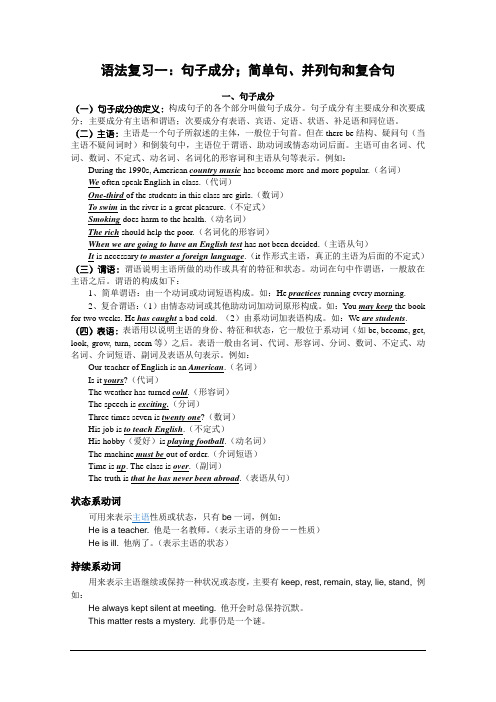
语法复习一:句子成分;简单句、并列句和复合句一、句子成分(一)句子成分的定义:构成句子的各个部分叫做句子成分。
句子成分有主要成分和次要成分;主要成分有主语和谓语;次要成分有表语、宾语、定语、状语、补足语和同位语。
(二)主语:主语是一个句子所叙述的主体,一般位于句首。
但在there be结构、疑问句(当主语不疑问词时)和倒装句中,主语位于谓语、助动词或情态动词后面。
主语可由名词、代词、数词、不定式、动名词、名词化的形容词和主语从句等表示。
例如:During the 1990s, American country music has become more and more popular.(名词)We often speak English in class.(代词)One-third of the students in this class are girls.(数词)To swim in the river is a great pleasure.(不定式)Smoking does harm to the health.(动名词)The rich should help the poor.(名词化的形容词)When we are going to have an English test has not been decided.(主语从句)It is necessary to master a foreign language.(it作形式主语,真正的主语为后面的不定式)(三)谓语:谓语说明主语所做的动作或具有的特征和状态。
动词在句中作谓语,一般放在主语之后。
谓语的构成如下:1、简单谓语:由一个动词或动词短语构成。
如:He practices running every morning.2、复合谓语:(1)由情态动词或其他助动词加动词原形构成。
如:Y ou may keep the book for two weeks. He has caught a bad cold. (2)由系动词加表语构成。
中考英语语法专项复习:简单句、并列句和复合句
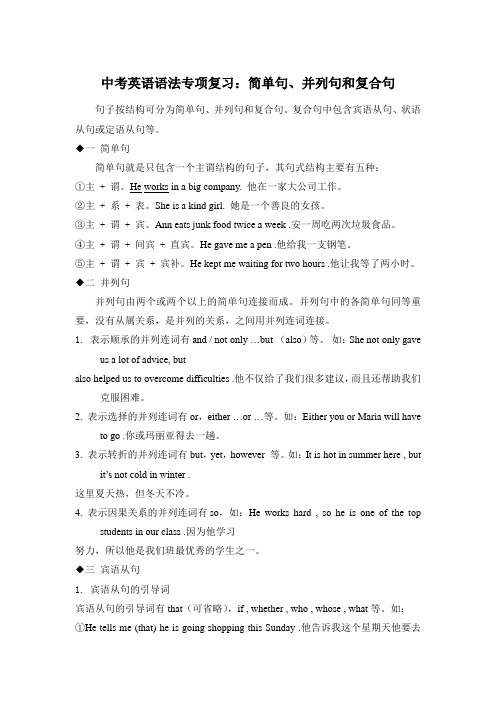
中考英语语法专项复习:简单句、并列句和复合句句子按结构可分为简单句、并列句和复合句。
复合句中包含宾语从句、状语从句或定语从句等。
◆一简单句简单句就是只包含一个主谓结构的句子,其句式结构主要有五种:①主 + 谓。
He works in a big company. 他在一家大公司工作。
②主 + 系 + 表。
She is a kind girl. 她是一个善良的女孩。
③主 + 谓 + 宾。
Ann eats junk food twice a week .安一周吃两次垃圾食品。
④主 + 谓 + 间宾 + 直宾。
He gave me a pen .他给我一支钢笔。
⑤主 + 谓 + 宾 + 宾补。
He kept me waiting for two hours .他让我等了两小时。
◆二并列句并列句由两个或两个以上的简单句连接而成。
并列句中的各简单句同等重要,没有从属关系,是并列的关系,之间用并列连词连接。
1. 表示顺承的并列连词有and / not only …but (also)等。
如:She not only gaveus a lot of advice, butalso helped us to overcome difficulties .他不仅给了我们很多建议,而且还帮助我们克服困难。
2. 表示选择的并列连词有or,either …or …等。
如:Either you or Maria will haveto go .你或玛丽亚得去一趟。
3. 表示转折的并列连词有but,yet,however 等。
如:It is hot in summer here , butit’s not cold in winter .这里夏天热,但冬天不冷。
4. 表示因果关系的并列连词有so,如:He works hard , so he is one of the topstudents in our class .因为他学习努力,所以他是我们班最优秀的学生之一。
简单句,并列句,复合句
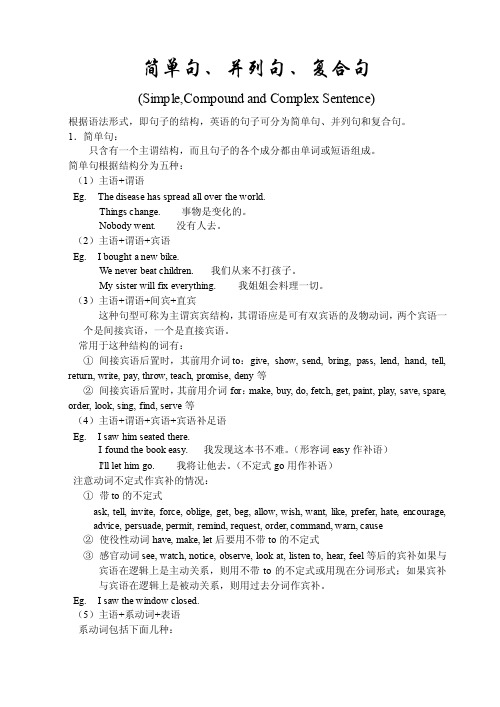
简单句、并列句、复合句(Simple,Compound and Complex Sentence)根据语法形式,即句子的结构,英语的句子可分为简单句、并列句和复合句。
1.简单句:只含有一个主谓结构,而且句子的各个成分都由单词或短语组成。
简单句根据结构分为五种:(1)主语+谓语Eg. The disease has spread all over the world.Things change. 事物是变化的。
Nobody went. 没有人去。
(2)主语+谓语+宾语Eg. I bought a new bike.We never beat children. 我们从来不打孩子。
My sister will fix everything. 我姐姐会料理一切。
(3)主语+谓语+间宾+直宾这种句型可称为主谓宾宾结构,其谓语应是可有双宾语的及物动词,两个宾语一个是间接宾语,一个是直接宾语。
常用于这种结构的词有:①间接宾语后置时,其前用介词to:give, show, send, bring, pass, lend, hand, tell, return, write, pay, throw, teach, promise, deny等②间接宾语后置时,其前用介词for:make, buy, do, fetch, get, paint, play, save, spare, order, look, sing, find, serve等(4)主语+谓语+宾语+宾语补足语Eg. I saw him seated there.I found the book easy. 我发现这本书不难。
(形容词easy作补语)I'll let him go. 我将让他去。
(不定式go用作补语)注意动词不定式作宾补的情况:①带to的不定式ask, tell, invite, force, oblige, get, beg, allow, wish, want, like, prefer, hate, encourage, advice, persuade, permit, remind, request, order, command, warn, cause②使役性动词have, make, let后要用不带to的不定式③感官动词see, watch, notice, observe, look at, listen to, hear, feel等后的宾补如果与宾语在逻辑上是主动关系,则用不带to的不定式或用现在分词形式;如果宾补与宾语在逻辑上是被动关系,则用过去分词作宾补。
初升高英语衔接语法部分---句子成份,简单句,并列句,复合句
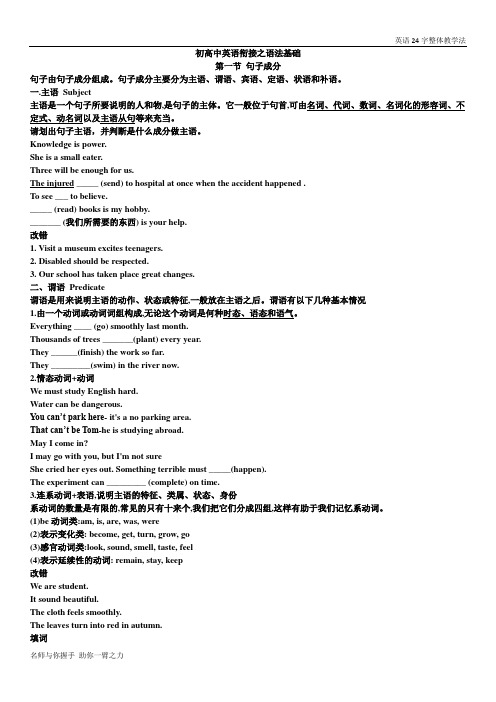
初高中英语衔接之语法基础第一节句子成分句子由句子成分组成。
句子成分主要分为主语、谓语、宾语、定语、状语和补语。
一.主语Subject主语是一个句子所要说明的人和物,是句子的主体。
它一般位于句首,可由名词、代词、数词、名词化的形容词、不定式、动名词以及主语从句等来充当。
请划出句子主语,并判断是什么成分做主语。
Knowledge is power.She is a small eater.Three will be enough for us.The injured _____ (send) to hospital at once when the accident happened .To see ___ to believe._____ (read) books is my hobby._______ (我们所需要的东西) is your help.改错1. Visit a museum excites teenagers.2. Disabled should be respected.3. Our school has taken place great changes.二、谓语Predicate谓语是用来说明主语的动作、状态或特征,一般放在主语之后。
谓语有以下几种基本情况1.由一个动词或动词词组构成,无论这个动词是何种时态、语态和语气。
Everything ____ (go) smoothly last month.Thousands of trees _______(plant) every year.They ______(finish) the work so far.They _________(swim) in the river now.2.情态动词+动词We must study English hard.Water can be dangerous.You can’t park here- it's a no parking area.That can’t be Tom-he is studying abroad.May I come in?I may go with you, but I'm not sureShe cried her eyes out. Something terrible must _____(happen).The experiment can _________ (complete) on time.3.连系动词+表语,说明主语的特征、类属、状态、身份系动词的数量是有限的,常见的只有十来个,我们把它们分成四组,这样有助于我们记忆系动词。
高中英语语法_句子成分

Our teacher encouraged us to work hard. The boy made his sister cry.
1)、接名词作补足语:call, choose, think,
consider, believe, find, make, etc. 2)、接动词不定式作补足语:see, notice, hear, have, watch, let, make(+do)/ ask, order, require, want, advise, persuade, cause, teach, encourage, permit, allow, forbid, (+to do). 不能用此结构:suggest, demand, hope, agree. 3)、接形容词作补足语:think, believe, find, feel, consider, keep, leave, drive, wish, make, get, paint(粉刷,漆).
It’s
my book, this cover written my name and my school. Have a teacher picked up, bring his office, afterwards, in Monday give me. Although I find box, nothing. I find desk, nothing. She said, this was a driver gave she the bag. In my go home way, …
英语的基本成分有八种:
主语(subject) 谓语(predicate) 宾语(object) 表语(predicative) 定语(attribute) 状语 (adverbial) 补足语 (complement) 同位语(appositive)
初高中英语的衔接--句子的基本结构:简单句、并列句和复合句

基础语法(句子成分;简单句、并列句和复合句)一、句子成分概述(一)句子成分的定义:构成句子的各个部分叫做句子成分。
句子成分有主要成分和次要成分;主要成分有主语和谓语;次要成分有表语、宾语、定语、状语、补足语和同位语。
(二)成分导图概览:【例句】主语:Two thirds of the water is absorbed.谓语:1、简单谓语:He practices running every morning.2、复合谓语:You may keep the book for two weeks.【注】由系动词加表语也构成复合谓语。
如:We are students.表语:Our teacher of English is an American.(名词)The weather has turned cold.(形容词)The speech is exciting.(分词)Three times seven is twenty one?(数词)His job is to teach English.(不定式)His hobby(爱好)is playing football.(动名词)The machine must be out of order.(介词短语)Time is up. The class is over.(副词)The truth is that he has never been abroad.(表语从句)宾语:T hey went to see an exhibition(展览)yesterday.(名词)The heavy rain prevented me form coming to school on time.(代词)How many dictionaries do you have? I have five.(数词)They helped the old with their housework yesterday.(名词化形容词)He pretended not to see me.(不定式短语)I enjoy listening to popular music.(动名词短语)I think(that)he is fit for his office.(宾语从句)宾语补足语:His father named him Dongming.(名词)They painted their boat white.(形容词)Let the fresh air in.(副词)You mustn’t force him to lend his money to you.(不定式短语)We saw her entering the room.(现在分词)We found everything in the lab in good order.(介词短语)We will soon make our city what your city is now.(从句)定语:G uilin is a beautiful city.(形容词)China is a developing country; America is a developed country.(分词)There are thirty women teachers is our school.(名词)His rapid progress in English made us surprised.(代词)Our monitor is always the first to enter the classroom.(不定式短语)The teaching plan for next term has been worked out.(动名词)He is reading an article about how to learn English.(介词短语)状语:Light travels most quickly.(副词及副词性词组)He has lived in the city for ten years.(介词短语)He is proud to have passed the national college entrance examination.(不定式短语)He is in the room making a model plane.(分词短语)Wait a minute.(名词)Once you begin, you must continue.(状语从句)【巩固训练一】一、指出下列句子划线部分是什么句子成分:1. The students got on the school bus.2. He handed me the newspaper.3. I shall answer your question after class.4. What a beautiful Chinese painting!5. They went hunting together early in the morning.6. His job is to train swimmers.7. He took many photos of the palaces in Beijing.8. There is going to be an American film tonight.9. He is to leave for Shanghai tomorrow.10. His wish is to become a scientist.11. He managed to finish the work in time.12. Tom came to ask me for advice.13. He found it important to master English.14. Do you have anything else to say?15. To be honest, your pronunciation is not so good.16. Would you please tell me your address?17. He sat there, reading a newspaper.18. It is our duty to keep our classroom clean and tidy.19. He noticed a man enter the room.20. The apples tasted sweet.二、用符号划出下列短文各句中的主语(=)、谓语(—)、宾语(~):I hope you are very well. I'm fine, but tired. Right now it is the summer vacation and I'm helping my Dad on the farm. August is the hottest month here. It is the time of year for the rice harvest, so every day I work from dawn until dark. Sometimes we go on working after dark by the lights of our tractors. We grow rice in the south of the States, but in the north where it is colder they grow wheat. We have a lot of machines on the farm. Although the farm is large, my Dad has only two men working for him. But he employs more men for the harvest. My brother takes care of the vegetable garden. It doesn't often rain in the summer here. As a result, we haveto water the vegetable garden. Every evening we pump water from a well. It then runs alongchannels to different parts of the garden.三、用符号划出下列短文各句中的定语()、状语[ ]、补语< >:Most Saturday evenings there is a party, even at harvest time. These parties often make us very happy. We cook meat on an open fire outside. It's great! Americans eat a lot of meat — too much in my opinion. Some of my friends drink beer. I don't, because I have to drive home after the party. In your letter you asked about the time in different areas of the States. There are five different time areas in the States. In my state we are fourteen hours behind Beijing time. How many different time areas do you have in China? Well, I must stop and get some sleep. Pleasegive my best regards to your parents.四、选择填空:1. ____ will leave for Beijing.A. Now there the manB. The man here nowC. The man who is here nowD. The man is here now2. The weather ____.A. wet and coldB. is wet and coldC. not wet and coldD. were wet and cold3. The apple tasted ____.A. sweetsB. sweetlyC. nicelyD. sweet4. He got up ____ yesterday morning.A. latelyB. lateC. latestD. latter5. The actor ______at the age of 70.A. deadB. diedC. dyedD. deaded6. ____ were all very tired, but none of ____ would stop to take a rest.A. We, usB. Us, weC. We, ourD. We, we7. He found the street much ______.A. crowdB. crowdingC. crowdedD. crowdedly8.I think _____necessary to learn English well.A. itsB. itC. thatD. that is9. The dog ____ mad.A. looksB. is lookedC. is being lookedD. was looked10.I will never forget the day ______ I joined the army.A. thatB. whenC. in whichD. where二、句子的种类(一)句子的分类导图【例句】判断下列句子所属:Be careful, boys; Don’t talk in classHow clever the boy is!He often reads English in the morning.Tom and Mike are American boys.She likes drawing and often draws pictures for the wall newspapers.You help him and he helps you.The future is bright; the road is tortuous.The foreign visitors took a lot of pictures when they were at the Great Wall.(二)简单句的五种基本句型及用法简介:英语基本句型有五个:S+V,S+V+Cs,S+V+O,S+V+Oi+Od,S+V+Od+Co,其共有特征是主谓结构(S+V)。
英语简单句、并列句、复合句解析

英语简单句、并列句、复合句解析简单句、并列句和复合句考点一简单句1. 简单句只包含一个主谓结构.2. 五种简单句:1) 主+谓. He comes at last.2) 主+系+表. She is a teacher.The soup tastes nice.3) 主+谓+宾. They reached the village.4) 主+谓+间宾+直宾.He gave me a pen.5) 主+谓+宾+宾补.I find that book very useful.考点二并列句并列句:两个或两个以上的简单句,用连词连接起来。
常用的连接词有:1. 表示顺承关系的:and, not only…but also(不仅….而且….)等。
She ______ gave us a lot of advice, _______helped us to overcome difficulties.Linda tried to become an excellentteacher, _____ at last she succeeded.2. 表示选择关系和否定条件的有or(还是,否则)Do you want to leave now ____ would yourather set off later?Wear your coat, ____ you’ll catch a cold.3. 表示转折关系的有but, yet等。
He is young, but he works hard.虽然他年轻,但工作努力。
4. 表示因果关系的有for, so 等。
My leg hurts so I go to see a doctor. 我的腿疼,因此我去看医生。
考点三主从复合句:宾语从句1. 宾语从句的引导词(1)引导陈述句用that(在口语和非正式文体中常常省略)He tells me (that ) he is going shopping thisSunday.(2) 引导一般疑问句用if或whether.She asked me if\ whether she could join us.(whether…or not)(3) 引导特殊疑问句,要用原来的特殊疑问词。
高一英语基础语法复习(句子成分;简单句、并列句和复合句).docx

高一英语基础语法复习(句子成分;简单句、并列句和复合句)一、句子成分概述(-)◎子成分的定义:构成句子的各个部分叫做句子成分。
句子成分有主要成分和次要成分;主要成分有主语和谓语;次要成分有表语、宾语、定语、状语、补足语和同位语。
(二)成分导图概览:句子所叙述的主体,由名词、代词、数词、不定式、动名词、 -名词化的形容词和主语从句等充当:Heworks hard.简单谓语:由一个动词或动词短语构成。
(复合谓语:谓语说明主语所做的动作或具有的特征和状态由情态动词或其他助动词加动词原形构成.说明主语的身份、特征和状态,位于系动词(SQbe, become, get, look, grow. turn, seem^)之表语后。
由名词、代词、形容词、分词、数词、不定式、动名词、介词短语、副词及表语从句等充当• 宾语表示动作的对象或承爱者,一般位于及物动词和介词后面。
及物动词,除有一个直接宾语以外,还要有一个宾吾补语,才能使句子的意义完整。
宾语补足语常做补语的词为形容词、副词、名词、分词、不定式、介词短语、从句.J —般句型为;某些及物动词(如:We should make our town more beau^ful)亠污通常修饰名词或代词的词、短语或从句称为定语。
疋|口由形容词、分词i不定武短语i动名词、介词短语或从句充当。
修饰动词、形容词、副词或整个句子,说明动作或状态特征的句子成分,叫做状语。
常常由副词及副词性词组、介词短语、不定式短语、分词短语、从句等充当.【例句】主语:Two thirds of the water is absorbed ・谓语:1、简单谓语:He practices running every morning.2、复合谓语:You mav keep the book for two weeks・【注】由系动词加表语也构成复合谓语。
女口:We are students.表语:Our teacher of English is an Americcm.(名词)The weather has turned cold.(形容词)The speech is excifi哄(分词)Three times seven is twenty one?(数词)His iob is to teach English・(不定式)His hobby (爱好)is plavin父football.(动名词)The machine must be out of order.(介词短语)Time is 些.The class is over.(畐U 词)The truth is that he ha, never been abroad.(表语从句)宾语:They went to see an exhibition(展览)yesterday.(名词)The heavy rain prevented me form coming to school on time・(代i司)How many dictionaries do you have? I have five.(数i司)They helped the old with their housework yesterday.(名词化形容词)He pretended not to s% me.(不定式短语)I enjoy list€"in父to popular music.(动名词短语)I think (that) he is fit for his office.(宾语从句)宾语补足语:His father named him Don父/nin父.(名词)They painted their boat white.(形容词)Let the fresh air in.(副词)You mustn't force him to lend his to voa(不定式短语)We saw her eMerinp the room.(现在分词)We found everything in the lab in good order.(介词短语)We will soon make our city what voiir ciW is死ow.(从句)定语:Guilin is a beautiful city.(形容词)China is a dseloping country; America is a deveSped country.(分词)There are 什lirtv women teachers is our school.(名词)His rapid progress in English made us surprised.(代i司)Our monitor is always the first to enter the classroom.(不定式短语)The teaching! plan for next term has been worked out.(动名词)He is reading an article about how to learn English.(介词短语)状语:Light travels most quick®.(副词及副词性词组)He has lived in the city for ten years.(介词短语)He is proud to have passed the national collie entrance exami讪ion.(不定式短语)He is in the room making ci model Dkme.(分词短语)Wait a minute.(名词)Once you b叹in、you must continue.(状语从句)【巩固训练一】一、指出下列句子划线部分是什么句子成分:1 ・ The students got on the school bus.2.He handed me the newspaper.3.1 shall answer your question after class.4.What a beautiful Chinese painting!5.They went hunting together early in the morning.6.His job is to train swimmers.7.He took many photos of the palaces in Beijing.& There is going to be an American film tonight.9.He is to leave for Shanghai tomorrow.10.His wish is to become a scientist.11.He managed to finish the work in time.12.Tom came to ask me for advice.13.He foundjt important to master English.14.Do you have anything else to say?15.To be honest; your pronunciation is not so good.16.Would you please tell me your address?17.He sat there, reading a newspaper.18.It is our duty to keep our classroom clean euid tidy.19.He noticed a man enter the room.20.The apples tasted sweet.二、用符号划出下列短文各句中的主语(一)、谓语(=)、宾语(〜):I hope you are very well. I'm fine, but tired. Right now it is the summer vacation and Pm helping my Dad on the farm. August is the hottest month here・ It is the time of year for the rice harvest, so every day I work from dawn until dark・ Sometimes we go on working after dark by the lights of our tractors- We grow rice in the south of the States, but in the north where it is colder they grow wheat. We have a lot of machines on the farm. Although the farm is large, my Dad has only two men working for him. Buthe employs more men for the harvest. My brother takes care of the vegetable garden- It doesn't often rain in the summer here. As a result, we have to water the vegetable garden. Every evening we pump water from a well. It then runs along channels to different parts of the garden.三、用符号划出下列短文各句中的定语(一)、状语(=)、补语(〜):Most Saturday evenings there is a party, even at harvest time. These parties often make us very happy. We cook meat on an open fire outside・ It's great! Americans eat a lot of meat 一too much in my opinion. Some of my friends drink beer. I don°t, because I have to drive home after the party. In your letter you asked about the time in different areas of the States. There are five different time areas in the States, In my state we are fourteen hours behind Beijing time. How many different time areas clo you have in China? Well, I must stop and get some sleep. Please give my best regards to your parents.四、选择填空:1 • ___ w ill leave for Beijing.A. Now there the manB. The man here nowC. The man who is here nowD. The man is here now2.The weather ___ .A. wet ancl coldB. is wet and coldC・ not wet and cold D. were wet and cold3.The apple tasted ___ .A. sweetsB. sweetlyC. nicelyD. sweet4. He got up yesterday morning.A. latelyB. lateC. latestD. latter5. The actor at the age of 70.A. deadB. diedC. dyedD. deaded6. ___ were all very tired, but none of ____ w ould stop to take a rest.A. We, usB. Us, weC. We, ourD. We, we7. He found the street muchA. crowd 1B. crowdingC. crowdedD. crowdedly&I think necessary to learn English well.A. itsB.itC. thatD. that is9. The doe mad・A. looksB. is looked C・ is beinglooked D. was looked10.1 will never forget the day I joined the army.A. thatB. whenC. in whichD. where二、句子的种类(-)◎子的分类导图1)陈述句(肯定、否定)2)疑间句(一般、特殊、选择、反意)按句子的用途分:, -------------------------------------------.3)祈使句4)感叹句1)简单句:只有一个主语(或并列主语)和一个谓语(或并列谓语):2)并列句:由并列连词(and. but. orW)或分号(;)把两个或两个以按句子的结构分:上的简单句连在一起构成。
简单句并列句复合句

句子成分什么是句子?句子的定义:句子是包含主语和谓语部分的一组词。
句子的成分:句子由各个组成部分构成,这些组成部分叫做句子的成分。
句子的成分可分为:主语、谓语、表语、宾语、同位语、定语、状语、补语、独立成分等。
句子按其结构可分为:简单句、并列句、复合句、并列复合句。
句子结构一、简单句(Simple sentence)的构成:1.主语+系动词+表语(Subject+Linking verb+Predicative )1) He │was │a student.2) The dinner │smells │good.3) The trouble│is │that they are short of money.2. 主语+谓语(Subject+V erb)1) The moon │rose.2) We all │breathe, eat, and drink.注意:此句型的句子有一个共同特点,即句子的谓语动词都能表达完整的意思。
此种类型句子中谓语动词一般为不及物动词。
3.主语+谓语+宾语(S+V+Object)1) He │enjoys │reading.2) He │has refused │to help them.注意:此句型句子谓语动词都具有实义,都是主语产生的动作,但不能表达完整的意思,必须跟有一个宾语,即动作的承受者,才能使意思完整。
这类动词叫做及物动词。
4. 主语+谓语+双宾语(S+V+O+O)1) He │brought │you │a dictionary.=He │brought │a dictionary │for│you.2) He │showed │me │how to run the machine.注意:有些及物动词可以有两个宾语,这两个宾语通常一个指人,为间接宾语;一个指物,为直接宾语。
一般的顺序为:动词+ 间接宾语+ 直接宾语。
如:Give me a cup of tea, please. 或动词+ 直接宾语+介词+ 间接宾语。
- 1、下载文档前请自行甄别文档内容的完整性,平台不提供额外的编辑、内容补充、找答案等附加服务。
- 2、"仅部分预览"的文档,不可在线预览部分如存在完整性等问题,可反馈申请退款(可完整预览的文档不适用该条件!)。
- 3、如文档侵犯您的权益,请联系客服反馈,我们会尽快为您处理(人工客服工作时间:9:00-18:30)。
语法复习一:句子成分;简单句、并列句和复合句一、句子成分(一)句子成分的定义:构成句子的各个部分叫做句子成分。
句子成分有主要成分和次要成分;主要成分有主语和谓语;次要成分有表语、宾语、定语、状语、补足语和同位语。
(二)主语:主语是一个句子所叙述的主体,一般位于句首。
但在there be结构、疑问句(当主语不疑问词时)和倒装句中,主语位于谓语、助动词或情态动词后面。
主语可由名词、代词、数词、不定式、动名词、名词化的形容词和主语从句等表示。
例如:During the 1990s, American country music has become more and more popular.(名词)We often speak English in class.(代词)One-third of the students in this class are girls.(数词)To swim in the river is a great pleasure.(不定式)Smoking does harm to the health.(动名词)The rich should help the poor.(名词化的形容词)When we are going to have an English test has not been decided.(主语从句)It is necessary to master a foreign language.(it作形式主语,真正的主语为后面的不定式)(三)谓语:谓语说明主语所做的动作或具有的特征和状态。
动词在句中作谓语,一般放在主语之后。
谓语的构成如下:1、简单谓语:由一个动词或动词短语构成。
如:He practices running every morning.2、复合谓语:(1)由情态动词或其他助动词加动词原形构成。
如:You may keep the book for two weeks. He has caught a bad cold. (2)由系动词加表语构成。
如:We are students. (四)表语:表语用以说明主语的身份、特征和状态,它一般位于系动词(如be, become, get, look, grow, turn, seem等)之后。
表语一般由名词、代词、形容词、分词、数词、不定式、动名词、介词短语、副词及表语从句表示。
例如:Our teacher of English is an American.(名词)Is it yours?(代词)The weather has turned cold.(形容词)The speech is exciting.(分词)Three times seven is twenty one?(数词)His job is to teach English.(不定式)His hobby(爱好)is playing football.(动名词)The machine must be out of order.(介词短语)Time is up. The class is over.(副词)The truth is that he has never been abroad.(表语从句)(五)宾语:宾语表示动作的对象或承爱者,一般位于及物动词和介词后面。
例如:They went to see an exhibition(展览)yesterday.(名词)The heavy rain prevented me form coming to school on time.(代词)How many dictionaries do you have? I have five.(数词)They helped the old with their housework yesterday.(名词化形容词)He pretended not to see me.(不定式短语)I enjoy listening to popular music.(动名词短语)I think(that)he is fit for his office.(宾语从句)宾语种类:(1)双宾语(间接宾语+直接宾语),例如:Lend me your dictionary, please.(2)复合宾语(宾语+宾补),例如:They elected him their monitor.(六)宾语补足语:英语中有些及物动词,除有一个直接宾语以外,还要有一个宾语补语,才能使句子的意义完整。
带有宾语补足语的一般句型为:某些及物动词(如make等+宾语+宾补)。
宾补可由名词、形容词、副词、不定式、分词、介词短语和从句充当。
例如:His father named him Dongming.(名词)They painted their boat white.(形容词)Let the fresh air in.(副词)You mustn’t force him to lend his money to you.(不定式短语)We saw her entering the room.(现在分词)We found everything in the lab in good order.(介词短语)We will soon make our city what your city is now.(从句)(七)定语:修饰名词或代词的词、短语或从句称为定语。
定语可由以下等成分表示:Guilin is a beautiful city.(形容词)China is a developing country; America is a developed country.(分词)There are thirty women teachers is our school.(名词)His rapid progress in English made us surprised.(代词)Our monitor is always the first to enter the classroom.(不定式短语)The teaching plan for next term has been worked out.(动名词)He is reading an article about how to learn English.(介词短语)(八)状语:修饰动词、形容词、副词或整个句子,说明动作或状态特征的句子成分,叫做状语。
可由以下形式表示:Light travels most quickly.(副词及副词性词组)He has lived in the city for ten years.(介词短语)He is proud to have passed the national college entrance examination.(不定式短语)He is in the room making a model plane.(分词短语)Wait a minute.(名词)Once you begin, you must continue.(状语从句)状语种类如下:How about meeting again at six?(时间状语)Last night she didn’t go to the dance party because of the rain.(原因状语)I shall go there if it doesn’t rain.(条件状语)Mr Smith lives on the third floor.(地点状语)She put the eggs into the basket with great care.(方式状语)She came in with a dictionary in her hand.(伴随状语)In order to catch up with the others, I must work harder.(目的状语)He was so tired that he fell asleep immediately.(结果状语)She works very hard though she is old.(让步状语)I am taller than he is.(比较状语)练习一一、指出下列句子划线部分是什么句子成分:1. The students got on the school bus.2. He handed me the newspaper.3. I shall answer your question after class.4. What a beautiful Chinese painting!5. They went hunting together early in the morning.6. His job is to train swimmers.7. He took many photos of the palaces in Beijing.8. There is going to be an American film tonight.9. He is to leave for Shanghai tomorrow.10. His wish is to become a scientist.11. He managed to finish the work in time.12. Tom came to ask me for advice.13. He found it important to master English.14. Do you have anything else to say?15. To be honest; your pronunciation is not so good.16. Would you please tell me your address?17. He sat there, reading a newspaper.18. It is our duty to keep our classroom clean and tidy.19. He noticed a man enter the room.20. The apples tasted sweet.二、用符号划出下列短文各句中的主语(—)、谓语(=)、宾语(~):I hope you are very well. I'm fine, but tired. Right now it is the summer vacation and I'm helping my Dad on the farm. August is the hottest month here. It is the time of year for the rice harvest, so every day I work from dawn until dark. Sometimes we go on working after dark by the lights of our tractors. We grow rice in the south of the States, but in the north where it is colder they grow wheat. We have a lot of machines on the farm. Although the farm is large, my Dad has only two men working for him. But he employs more men for the harvest. My brother takes care of the vegetable garden. It doesn't often rain in the summer here. As a result, we have to water the vegetable garden. Every evening we pump water from a well. It then runs along channels to different parts of the garden.三、用符号划出下列短文各句中的定语(—)、状语(=)、补语(~):Most Saturday evenings there is a party, even at harvest time. These parties often make us very happy. We cook meat on an open fire outside. It's great! Americans eat a lot of meat — too much in my opinion. Some of my friends drink beer. I don't, because I have to drive home after the party. In your letter you asked about the time in different areas of the States. There are five different time areas in the States. In my state we are fourteen hours behind Beijing time. How many different time areas do you have in China? Well, I must stop and get some sleep. Please give my best regards to your parents.四、选择填空:( )1. ____ will leave for Beijing.A. Now there the manB. The man here nowC. The man who is here nowD. The man is here now( ) 2. The weather ____.A. wet and coldB. is wet and coldC. not wet and coldD. werewet and cold( ) 3. The apple tasted ____.A. sweetsB. sweetlyC. nicelyD. sweet( ) 4. He got up ____ yesterday morning.A. latelyB. lateC. latestD. latter( )5. The actor ______at the age of 70.A. deadB. diedC. dyedD. deaded( )6. ____ were all very tired, but none of ____ would stop to take a rest.A. We, usB. Us, weC. We, ourD. We, we( )7. He found the street much ______.A. crowdB. crowdingC. crowdedD. crowdedly( ) 8.I think _____necessary to learn English well.A. itsB. itC. thatD. that is( ) 9. The dog ____ mad.A. looksB. is lookedC. is being lookedD. was looked ( )10.I will never forget the day ______ I joined the army.A. thatB. whenC. in whichD. where二、简单句、并列句和复合句(一)句子种类两种分类法1、按句子的用途可分四种:1)陈述句(肯定、否定):He is six years old; She didn’t hear of you before.2)疑问句(一般、特殊、选择、反意):Do they like skating? How old is he? Is he six or seven years old? Mary can swim, can’t she?3)祈使句:Be careful, boys; Don’t talk in class4)感叹句:How clever the boy is!2、按句子的结构可分三种:1)简单句:只有一个主语(或并列主语)和一个谓语(或并列谓语)。
